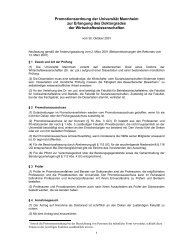Sommersemester 2006 - Abteilung Volkswirtschaftslehre der ...
Sommersemester 2006 - Abteilung Volkswirtschaftslehre der ...
Sommersemester 2006 - Abteilung Volkswirtschaftslehre der ...
Erfolgreiche ePaper selbst erstellen
Machen Sie aus Ihren PDF Publikationen ein blätterbares Flipbook mit unserer einzigartigen Google optimierten e-Paper Software.
Literatur:<br />
Baumol, W.J. und W.E. Oates, The Theory of environmental policy, 2. ed.,<br />
Cambridge, Univ. Press, 1988.<br />
Bergh, J.C.J.M. van den (ed.), Handbook of Environmental and Resource<br />
Economics, Edward Elgar, 1999.<br />
Cansier, D., Umweltökonomie, 2. ed., Lucius & Lucius, Stuttgart, 1996;<br />
Fees, E., Umweltökonomie und Umweltpolitik, Verlag Vahlen, 1995.<br />
Kemper, M., Das Umweltproblem in <strong>der</strong> Marktwirtschaft, 2. ed., Duncker<br />
und Humbold, Berlin, 1993.<br />
Kolstad, C.D., Environmental Economics, Oxford Univ. Press, 2000.<br />
Weimann, Joachim, Umweltökonomik, 3. ed., Springer Verlag, 1995.<br />
Course title: Umweltökonomik<br />
Instructor: Prof. Dr. Klaus Conrad<br />
Method (hours per week): lecture (2)<br />
Prerequisites: completed Grundstudium VWL or BWL<br />
Examination: written, 90 minutes<br />
ECTS-Credits: 5<br />
Course description: The goal is to define the field of environmental<br />
economics and to put it in perspective in relation to economics in general.<br />
The introduction deals with externalities, public goods and property rights.<br />
Section 2 presents theoretical approach to cope with environmental<br />
problems (Pigou, Coase, price-standard approach, permits). Section 3<br />
deals with environmental instruments un<strong>der</strong> asymmetric information and<br />
section 4 with environmental instruments un<strong>der</strong> imperfect competition.<br />
Section 5 gives a detailed discussion of environmental policy instruments<br />
and section 6 compares them with respect to their pros and cons (dynamic<br />
efficiency, incentive for induced technical change, etc.). Section 7 deals with<br />
some macroeconomic aspects of environmental protection (e.g. green<br />
accounting) and section 8 with the international dimension (transboundary<br />
pollution, the acid rain game, global pollution and global warming). For<br />
further information see http://www.vwl.uni-mannheim.de/conrad/Lehre/<br />
lehre.html<br />
Contact person: Prof. Dr. Klaus Conrad, Tel. +49 621 181-1896, L7, 3-5,<br />
room 3-43, E-mail: kconradrumms.uni-mannheim.de<br />
Langfristige Unternehmensplanung<br />
Seminar, 3st.<br />
Blockveranstaltung, Raum und Zeit siehe Aushang<br />
Grüner, Hans Peter<br />
Wehr, Alexan<strong>der</strong><br />
Dr. Alexan<strong>der</strong> Wehr ist general manager im Bereich zentrale Konzernplanung<br />
<strong>der</strong> BMW AG. In dem Seminar werden zunächst theoretische<br />
Konzepte <strong>der</strong> strategischen Unternehmensplanung besprochen. Ein<br />
beson<strong>der</strong>es Gewicht liegt auf Fragen <strong>der</strong> Positionierung im Wettbewerb.<br />
Anschließend werden ausgewählte Fallstudien aus dem Bereich <strong>der</strong><br />
Automobilindustrie untersucht.<br />
Teilnahme am Seminar nur nach voriger Bewerbung am Lehrstuhl.<br />
22















